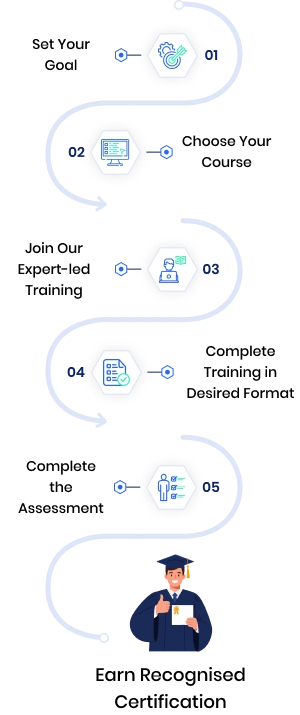Course Overview O v e r v i e w
- Course Overview
- Course Outline
- What’s Included
- What You’ll Learn
PMP® Certification Training Course Overview
The PMP® Certification Training Course is a globally respected programme designed for project management professionals. It covers the Project Management Institute’s (PMI) gold-standard framework, equipping learners with the knowledge and tools to manage projects of any size or complexity. This course is recognised across industries for its focus on best practices and real-world application.
Being formally trained in PMP® methodology offers significant advantages. It ensures you understand structured project management processes, risk management, and stakeholder engagement, all of which are essential for delivering successful projects. Formal training also boosts your confidence, enhances your professional credibility, and opens doors to new career opportunities worldwide.
Training Deals sets itself apart by offering expert-led instruction, comprehensive study resources, and flexible learning options tailored to your needs. Our course is designed to maximise your exam success and practical skills, ensuring you gain lasting value from your PMP® certification journey.

PMP® Certification Training Course Outline
Lesson 1: Business Environment
Topic A: Foundation
- Project
- Evolution of Project Management
- Project Management Office (PMO)
- OPM: A System for Value Delivery
- Projects, Programmes, Portfolios
- Organisational Structures
- Project Management Principles
- Agile
- Agile Manifesto for Software Development
- Principles Behind the Agile Manifesto
- Agile: The “Far Side” of Adaptive Approaches
- Tailor Projects to Contexts
- Tailor Hybrid Approaches, Processes, Practices and Methods
Topic B: Strategic Alignment
- PMI Talent Triangle®
- Strategic Alignment and Business Management Skills
- Organisational Influences
- Get to Know the External Business Environment
- Internal Business Environment Factors
- OPAs and EEFs
- Activity
Topic C: Project Benefits and Value
- Business Value
- Examine Business Value
- Types of Business Value
- Needs Assessment
- Business Documents
- Benefit Measurement Methods
- Project Selection Using Present Value (PV) and Net Present Value (NPV)
- How OKRs Help Deliver Business Value?
- Incremental Value Delivery
Topic D: Organisational Culture and Change Management
- Change Management
- Manage Organisational Change Impacts on Projects
- Get to Know Organisational Cultures and Styles
- Risk, Culture and Change in Organisations
- Change Management Framework
- Actions to Support Change
- Plan for Change
Topic E: Project Governance
- Project Governance
- Governance in Adaptive Projects
- Governance Board
- Governance Defines Escalation Procedures
- Governance and Life Cycles
- Project Phases
- Apply Governance to Predictive Project Phases
Topic F: Project Compliance
- Compliance
- Compliance Requirements
- Compliance Categories Classification
- Compliance Threats
- Treat Compliance as a Project Objective
- Best Practice
- Activity
Lesson 2: Start Project
Topic A: Identify and Engage Stakeholders
- Typical Project Stakeholders
- Stakeholder and Communications Management
- Stakeholder Identification
- Assess Stakeholders
- Create the Stakeholder Register
- Know Your Stakeholders
- Directions of Influence
- Salience Model
- Stakeholder Perceptions
- Capture Stakeholder Feedback and Perceptions
- Plan to Communicate with Stakeholders
- Communication Requirements Analysis
- Communication Methods and Technologies
- Communication Methods
- Communication Challenges and Considerations
- Communication Model
- Stakeholder Engagement Strategy
Topic B: Form the Team
- Create a Collaborative Team Culture
- Project Team Formation
- Project Manager Role in Adaptive Teams
- Hybrid Team Formation
- Project Team Composition
- Project Team Roles
- Identify Project Resource Requirements
- T-Shaped People and Self-Organising Teams
- Diversity, Equity and Inclusion Standards
- Experts and Expert Judgment
- Focus on Team Strengths
- Team Norms
- PMI® Code of Ethics and Professional Conduct
- Team Charter and Ground Rules
- Team Communication
- Colocated, Virtual or Both?
- Virtual Team Challenges
- Running Virtual Teams
- Address Virtual Team Member Needs
Topic C: Build Shared Understanding
- Seek Consensus for the Project Among the Team and Stakeholders
- Building a Shared Understanding
- Project Vision Statement
- Holistic Understanding of the Project
- How to Create Holistic Understanding of the Project
- Refer to Business Case and Business Needs
- Negotiate and Agree on Project Success Criteria
- Help Everyone Understand the Vision
- Got Agreement on the Project Agreements?
- Project Charter
Topic D: Project Approach
- First, Understand How and Why Approaches Differ
- Tailored Development Approaches
- Project or Product?
- Life Cycle and Development Approach
- Predictive Life Cycle
- Adaptive Life Cycle
- Cadence
- Development Approach and Life Cycle Terminology
- Hybrid Life Cycle and Development Approach
- Hybrid Project Approaches
- What Can Be Tailored?
- Development Approaches
- Assess Complexity
- Suitability Filter
- Scrum
- Scrum Ceremonies
- Agile Ceremonies
Lesson 3: Plan the Project
Topic A: Planning Projects
- Planning Starts with a Project Management Plan
- Project Documents
- Collaborative Planning
Topic B: Scope
- Adaptability and Resilience in Planning
- MVP or MBI?
- Product Roadmap
- Milestones
- Requirements
- Document Requirements
- Requirements Management Plan
- Types of Requirements
- Collect Requirements Process
- Data Gathering
- Represent Data
- Context Diagrams
- Prototyping
- Scope Management Plan
- Project Scope Statement
- Scope Planning
- Create the Work Breakdown Structure (WBS)
- Decompose Work in the WBS
- WBS Dictionary
- Scope Baseline
- Don’t Forget to Plan for Transitions / Handovers
- Scope Planning in Adaptive Environments
- Release and Iteration Planning
- Backlogs
- User Stories, Story Maps, Roadmaps
- Prioritise and Refine the Backlog
Topic C: Schedule
- Schedule Management Plan
- Schedule Management Plan Components
- Start with Benchmarks and Historical Data
- Hybrid Schedules
- Predictive Schedule Planning
- Break Down Project Activities
- Activity Dependency Types
- Precedence Relationships
- Activity Duration Estimate Terminology
- Critical Path Method
- Network Diagram with Date and Dependencies
- Project Schedule
- Schedule Presentation Formats
- Resource Optimisation
- Schedule Compression Techniques
- Schedule Baseline
- Special Intervals
- Schedule Management in Adaptive Environments
- Working with Features
- Agile Release Planning
- Definition of Ready (DoR) and Definition of Done (DoD)
- Reprioritise Sprint / Iteration Backlog
- Hybrid Scheduling Models
Topic D: Resources
- Resource Management Plan
- Assign Resources and Allocate Responsibilities
- Use Resource Calendars
- Responsibility Assignment Tools
- Adaptive Resource Planning
- Filling Resource Needs
- Plan the Procurement Strategy
- Procurement Management Plan
- Procurement Documents
- Formal Procurement Processes
- Source Selection Criteria
- Qualified Vendors
- Contracts
- Types of Contracts
- Components of Contracts
Topic E: Budget
- Budget Planning
- Predictive Budget Planning
- Check with Organisation
- Historical Data
- Project Budget
- Budget Considerations
Topic F: Risks
- Risk
- Project Risks
- Create Risk Strategy
- Define and Refine Risk Management Approach
- Inherent Risk
- Risk Identification Techniques
- Risk Breakdown Structure
- Assess Risks
- Probability and Impact Matrix
- Quantitative Risk Analysis Methods
- Risk Response
- Plan Risk Response
- Risk Response Strategies
Topic G: Quality
- Quality
- Stakeholder and Customer Expectations of Quality
- Quality Management Plan
- Compliance Requirements
- Quality Standards and Regulations
- Discussion
- Quality Metrics, Checklists, and Processes
- Quality Methods for Continuous Improvement
Topic H: Integrate Plans
- Integrating Plans
- Change Control
- Plan for Complexity and Change
- How to Approach Complex Plans?
Lesson 4: Lead the Project Team
Topic A: Craft Your Leadership Skills
- Power Skills
- Guidelines for Developing Inclusive Leadership Competencies
- Leadership Skills and Competencies
- Interpersonal and Team Skills
- Leadership Styles
- Leadership Management
- Servant Leadership
- Adopt a Growth Mindset
- Team-Building
- Balance Team Tone with Sense of Urgency
- Virtual Team Member Engagement
- Virtual Team Best Practice
Topic B: Create a Collaborative Project Team Environment
- Where and How the Team Works?
- “Agile” Space for Hybrid Teams
- Work Information Management Systems
- Information Storage and Distribution Good Practices
- Standardise Artifacts
- Tailor Artifacts
- Maintain Artifacts
- Version Control
Topic C: Empower the Team
- Empowerment, Unity, Autonomy
- Support Diversity, Equity & Inclusion (DEandI)
- Create Psychological Safety and Embrace Diversity
- Motivational Theories and Approaches
- McGregor’s Theory X and Theory Y
- Uphold Team Charter and Ground Rules
- Use Rewards and Recognition
- Decision-Making
- Display Task Accountability
Topic D: Support Team Member Performance
- Manage and Lead
- Assess Team Member Performance
- Performance Assessment Tasks
- Personality Indicators
- Use Personality Research to Coach Team Members
- Emotional Intelligence
- Empathy
- Social Skills
Topic E: Communicate and Collaborate with Stakeholders
- Monitor Stakeholders and Their Engagement
- Managing Project Communications
- Reports and Formal Communication
- How to Collaborate?
- Use Information Radiators
- Collaboration Activities
- Communicate and Collaborate to Negotiate
- Meetings
- Stakeholder Engagement Assessment Matrix (SEAM)
Topic F: Training, Coaching and Mentoring
- Foster a Knowledge-Sharing Culture
- How to Acquire Required Competencies?
- Plan for Training, Coaching and Mentoring
- Know the Value of Training, Coaching and Mentoring
- Training, Coaching and Mentoring Discussion
- Elements of Training
- Coach Teams and Individuals in Project Management
- Self-Organising Teams Collaborate and Learn
- Measure Training Outcomes
- Maintain Mentorships
Topic G: Manage Conflict
- Why Conflict Management Matters?
- Causes of Conflict
- Conflict as Part of Team Culture
- How to Handle Conflict?
Lesson 5: Support Project Team Performance
Topic A: Implement Ongoing Improvements
- Continuous Improvement (CI)
- Kaizen
- Assess Current CI Methods
- Conduct Retrospectives
- Improve Your Improvement Methods
- Update Processes and Standards
- Interactive/Discussion
- Lead with an Improvement Mindset
Topic B: Support Performance
- Project Team Leadership Objectives
- Manage with Objectives, Tolerances, Thresholds
- Optimise Communication
- Use Feedback to Support High Performance
- Support Team Task Accountability
- Show Roles and Responsibilities
- Curate Knowledge as an Asset
- Incorporate Knowledge Transfer Opportunities
- Knowledge Management
- Learn the Right Way to Motivate Your Team
- Continuously Realign Team Efforts with Value Delivery
- Check on Artifact Maintenance
Topic C: Evaluate Project Progress
- Guidelines to Measuring Performance
- Report on Performance
- Schedule Management Tools
- Visualise Performance
- Information Radiators
- Task Board
- Estimate Velocity
- Continuous Flow Approaches
- Budget Challenges
- Earned Value Management (EVM)
- EAC/ETC Analysis
- EVM
- Manage and Lead Resources
- Physical Resource Management
- Update Resource Allocation
- Handle Contract Changes and Disputes
- Quality Management Guidelines
- Quality Audit
- Control Quality Tools
- Control Quality Process
- Data Visualisation
- Data Visualisation Quality Tool
- Ensure Quality of Processes and Product
- Verify Deliverables
- Evaluate and Manage Risk
- Monitor Risks
- Review Reserves
- Risk Register
- Interactive/Discussion
- Manage Compliance as the Highest Priority
- Examine Business Value
Topic D: Manage Issues and Impediments
- Issue or Impediment? Just Solve the Problem
- Risks and Issues
- Issues
- Issue Resolution
- Discover and Solve Impediments Using Scrum
- Remove Impediments
- Discussion
Topic E: Manage Changes
- Interactive and Discussion
- Causes of Project Changes
- Be a Changemaker and a Change Leader
- Monitor the External Business Environment
- Change Requests
- Change Control Systems
- Manage Contract Changes and Resolve Problems
- Contract Change Control System
- Types of Contract Changes
- Legal Concepts When Managing Disputes
- Process, Adjudicate and Communicate Claims
- Update Project Management Plan
Lesson 6: Close the Project Phase
Topic A: Project/Phase Closure
- Why Projects or Phases Close?
- Transitions
- Transition / Handover Readiness
- Transition / Handover Activities
- Interactive / Activity
- Paying and Closing Contracts
- Finalising Contracts
Topic B: Benefits Realisation
- Early and Long-Term Benefits Realisation
- Benefits Management Plan
Topic C: Knowledge Transfer
- Knowledge Management During Closing
- Conduct Project Retrospective
- Finalise Lessons Learned
- Consolidating Lessons Learned

What’s included in this PMP® Certification Training Course?
- Expert-led Training Sessions by Certified Instructors
- Digital Delegate Pack
What You’ll Learn in this Course
This course guides you from the essentials of project management to confidently applying PMI’s global standards in practical settings. Each stage strengthens your skills, enabling you to lead projects effectively and achieve strong results across different industries.
- Learn core principles and domains of project management.
- Learn to manage scope, schedule, cost, and quality.
- Learn to lead teams and engage project stakeholders.
- Learn to identify and respond to project risks.
- Learn to align projects with strategic business objectives.
- Learn to deliver value through structured project execution.


Our Upcoming Batches
Mon 9 Mar 2026 - Fri 13 Mar 2026
Duration: 5 Days
Mon 16 Mar 2026 - Fri 20 Mar 2026
Duration: 5 Days
Mon 23 Mar 2026 - Fri 27 Mar 2026
Duration: 5 Days
Mon 30 Mar 2026 - Fri 3 Apr 2026
Duration: 5 Days
Mon 7 Sep 2026 - Fri 11 Sep 2026
Duration: 5 Days Buxton
Mon 28 Dec 2026 - Fri 1 Jan 2027
Duration: 5 Days Buxton
Mon 6 Apr 2026 - Fri 10 Apr 2026
Duration: 5 Days Corby
Mon 13 Apr 2026 - Fri 17 Apr 2026
Duration: 5 Days Corby
Request More Information

Corporate Training
Elevate your workforce with expert-led corporate training that enhances skills, boosts productivity, and aligns teams with your business goals.

Individuals Training
Unlock personal growth and sharpen professional skills with tailored training designed to build your confidence and career success.
Your Path to Professional Recognition
Our path is designed to guide you through each stage with clarity, support and practical learning, helping you achieve your goals with confidence.

Step Forward with Globally Recognised Certification
A recognised certification is more than a credential. It’s proof of your commitment to professional excellence, providing you with the credibility, confidence, and global reach to advance your career in exciting new directions.
Globally Certified Professionals Over Time
Career Growth
81%Certified professionals reported receiving a promotion after earning their certification.
Global Opportunities
89%Certified professionals experienced access to new career opportunities, including leadership roles and global positions.
Not able to find what you are looking for
Our experts will guide you to the right course from thousands worldwide: tailored to your goals.
Frequently Asked Questions
The Project Management Professional (PMP®) certification is a globally recognised credential offered by the Project Management Institute (PMI) for experienced project managers.
Eligibility typically requires a combination of project management experience and formal education. Applicants must also complete 35 hours of project management training.
The course covers project management processes, knowledge areas, best practices, and the latest updates from the PMI’s PMBOK® Guide.
The PMP® exam consists of 180 multiple-choice questions, covering three domains: People, Process, and Business Environment.
PMP® certification demonstrates your expertise and commitment to project management, increasing your job prospects and earning potential globally.
What Our Customers Say About Us
 Matthew Sullivan
HR Business Partner
Matthew Sullivan
HR Business Partner
Our HR team registered for the Change Management Foundation & Practitioner Training Course, and it couldn’t have been more valuable. The team gained practical frameworks to guide employees smoothly through transitions with confidence.
 Olivia Barrett
Operations Manager
Olivia Barrett
Operations Manager
Our operations staff completed the Lean Six Sigma Green Belt Training Course, and it has been transformative. We can now identify inefficiencies quickly, and the tools we learned are already improving performance across the team.
 Benjamin Foster
Product Manager
Benjamin Foster
Product Manager
Our product team took part in the Agile Project Management Foundation & Practitioner (AgilePM®) Training Course, and the difference is remarkable. We’re now more adaptive, collaborative, and efficient in managing change.
 Lucy Harper
IT Support Lead
Lucy Harper
IT Support Lead
Our IT support unit attended the ITIL® 4 Foundation Training Course, and the results have been impressive. Processes are smoother, collaboration has improved, and the team finally speaks a common language of service management.
 Edward Clarke
Programme Manager
Edward Clarke
Programme Manager
We joined the PMP® Certification Training Course as a leadership group, and it was outstanding. The trainer made every concept practical, and the exam preparation resources helped the whole team feel ready to tackle complex projects.
 Amelia Rhodes
Project Officer
Amelia Rhodes
Project Officer
Our project office completed the PRINCE2® Foundation & Practitioner Training Course, and it has brought real clarity to how we manage projects. The trainer’s examples were excellent, and the team now follows a structured approach with confidence.

























